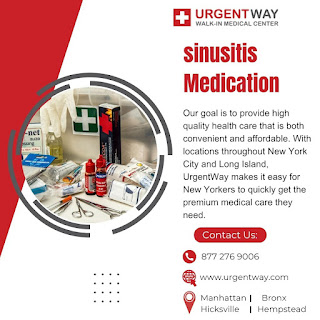Are there sinusitis medications that can be used alongside herbal supplements?
Are there sinusitis medications that can be used alongside herbal supplements?
Introduction:
ibiotics. But with the increased interest in complementary and alternative medicine, a lot of people are wondering what happens if these traditional treatments are combined with herbal supplements. This article examines the safety precautions, possible advantages, and interactions between herbal supplements and sinusitis drugs.
It's important
to comprehend sinusitis itself before delving into whether herbal supplements
work well with prescription sinusitis medicines. Inflammation of the sinus
lining tissue results in sinusitis, also called rhinosinusitis. Allergies,
environmental irritants, and bacterial, viral, or fungal infections can all
cause this inflammation. There are four categories for sinusitis:
Less than four weeks in duration, acute sinusitis is frequently brought on by
viral infections such as the common cold.
Four to twelve week-long subacute sinusitis: Usually develops after an
acute infection.
More than twelve weeks of persistent sinusitis, frequently brought on by
bacterial infections or protracted inflammation.
Recurrent Sinusitis: A number of acute sinusitis episodes that occur in
a single year.
Depending on
the severity and course of the illness, sinusitis symptoms can vary, but can
include:
·
Blockage or congestion of the nose
·
mucus buildup in the nose, frequently yellow or
green
·
facial pressure or pain
·
Headache
·
Cough Fatigue
·
diminished taste or smell perception
·
Traditional Remedies for Sinus Infections
·
A variety of drugs are usually used in
combination to treat sinusitis, with the goal of both symptom relief and
targeting the underlying cause of inflammation. Among the drugs that are most
frequently prescribed for sinusitis are:
Decongestants: By
constricting the blood vessels in the nasal passages, these drugs aid in the
relief of nasal congestion. They can be purchased as nasal sprays or pills for
oral use. Typical examples are oxymetazoline (Afrin) and pseudoephedrine
(Sudafed).
Antihistamines: Frequently used to treat allergy-related sinusitis,
antihistamines work by inhibiting the action of histamines, which cause
allergic reactions. They lessen nasal congestion, itching, and sneezing.
Cetirizine (Zyrtec), loratadine (Claritin), and diphenhydramine (Benadryl) are
examples of common antihistamines.
Corticosteroids: These anti-inflammatory drugs aid in lowering nasal
passageway edema and inflammation. Often prescribed as nasal sprays, such as
mometasone (Nasonex) or fluticasone (Flonase), they can also be given orally
or, in more extreme situations, as an injection.
Mucolytics: These drugs thin mucus, facilitating its removal from the
sinuses. One often used mucolytic is guaifenesin, often known as Mucinex.
Saline nasal sprays: These sprays relieve dryness and congestion by
moistening the nasal passages and thinning mucus.
The Use of Herbal Supplements in the Treatment of Sinusitis:
Herbal supplements are made from plants and are frequently used in
complementary or alternative medicine to promote overall health and reduce
symptoms of a range of illnesses, including sinusitis. The following are a few
of the most popular herbal supplements for sinusitis:
Echinacea: Known for strengthening the immune system, echinacea is
frequently used to treat and prevent sinusitis and other upper respiratory
infections. It is thought to lessen inflammation and boost the immune system.
Goldenseal: Often taken in conjunction with echinacea,
goldenseal is thought to possess antibacterial and anti-inflammatory qualities,
which makes it a well-liked remedy for bacterially-induced sinusitis.
Butterbur: This herb is used to treat sinusitis-related headaches and sinus
pressure. It is thought that butterbur possesses anti-inflammatory and
antihistamine qualities.
Garlic: The antibacterial qualities of garlic have long been recognized.
It is said to strengthen the immune system and aid in the battle against
infections, particularly those that lead to sinusitis.
Eucalyptus: To ease sinus pressure and nasal congestion, eucalyptus oil
is frequently inhaled steam. It contains anti-inflammatory and decongestant
qualities.
Peppermint: The menthol included in peppermint leaves the
nasal passageways open and congestion relieved. It is frequently used as a tea
or for steam inhalation.
Ginger: Due to its anti-inflammatory and antioxidant qualities, ginger
may help strengthen the immune system and lessen nasal inflammation.
Licorice Root: Often used to relieve sinusitis, this herb is thought to
calm irritated mucous membranes and lower inflammation.
Turmeric: Well-known for its anti-inflammatory qualities, turmeric is
frequently used to boost immune system function and lessen nasal irritation.
Sinus Infection
doctor At UrgentWay Walk-In Clinic:
Sinus infectiontreatment is available at all UrgentWay locations. We are open seven days a
week from morning to evening, giving you the freedom to visit us whenever it is
convenient.
Our experienced
providers will assess your condition, advise the best sinus infection treatment
accordingly and counsel you on preventative care.
Conclusion:
There are both advantages and disadvantages to using herbal supplements in
addition to sinusitis drugs, making the decision difficult to make. While some
herbal supplements may help with symptom alleviation, immune system support,
and inflammation reduction in conjunction with traditional treatments, it's
important to be mindful of possible interactions, adverse effects, and the
absence of regulations in the supplement sector.
In order to mix herbal supplements with sinusitis treatments in a safe and
efficient manner, people should speak with a healthcare professional, select
high-quality products, begin with small doses, and keep an eye on their body's
reaction. By adhering to these recommendations, people can take advantage of
complementary medicine's advantages while lowering risks and guaranteeing the
greatest results for their sinusitis treatment.
.png)



Comments
Post a Comment